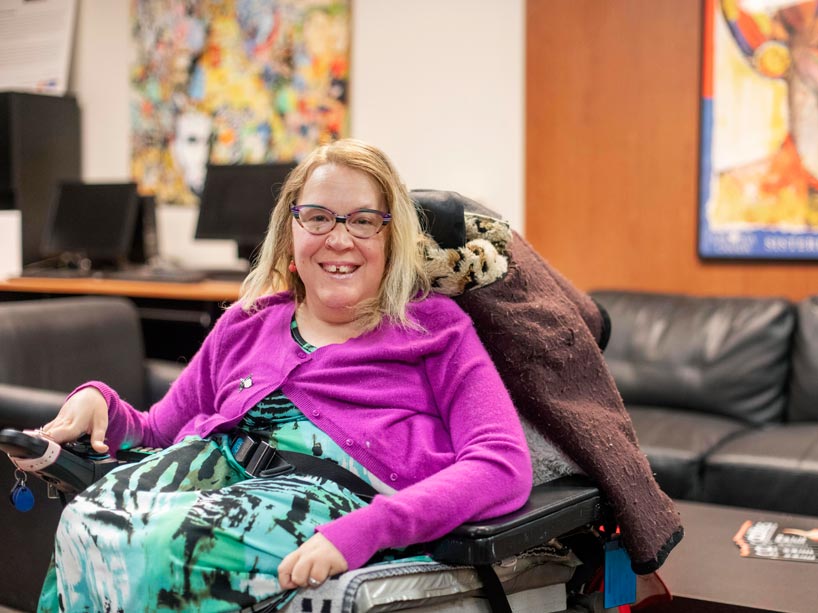Breaking new scholarly ground

Loree Erickson, the fourth Ethel Louise Armstrong (ELA) Foundation postdoctoral fellowship recipient in the School of Disability Studies, is focused on several areas of research, including “collective care” initiatives and “cultures of undesirability.” Photo: Alia Youssef.
“Changing the face of disability on the planet” is the mission of the Ethel Louise Armstrong (ELA) Foundation. One of the ways it has done that is by funding scholarships and fellowships at colleges and universities across North America, including Ryerson.
In fact, the appointment of Loree Erickson as the ELA Foundation postdoctoral fellow in the School of Disability Studies in September 2018 marked the fourth such award for Ryerson.
“I was thrilled. I already knew the people here in Disability Studies, and have known some of the previous ELA fellows, and was excited to have the opportunity to come and work with some really excellent people,” said Erickson. “I’ve had wonderful opportunities to collaborate here. We all have interesting conversations and strategize and share what we’re doing.”
That collaboration has included working with professors Esther Ignagni and Eliza Chandler (a previous ELA fellow) on community-based or “collective” care, something Erickson is very familiar with.
“I have been meeting my daily care needs through a collective of volunteers from my community for almost 20 years,” she explained. “Esther and Eliza and I realized quickly how care is a very central pivot point in all of our interests.”
The three received funding through a Faculty of Community Services Seed Grant.
“That grant is going to allow for the creation of a template for a website on collective care,” said Erickson. “I’m excited to create a space and a resource for people who are interested in doing collective care or who are currently doing collective care but feel they’re not getting community and support around that.”
Originally from northern Virginia, Erickson completed her PhD in environmental studies at York University. Her dissertation is entitled Unbreaking Our Hearts: Cultures of Undesirability and the Transformative Potential of Queercrip Porn. She is also the creator of want, an internationally award-winning queercrip porn film.
During her fellowship, Erickson plans to build on ideas central to her dissertation, including a concept she refers to as “cultures of undesirability.”
“I’m going to try and pull together a summit or a meeting or a conference on this concept,” she said, “to explore how marginalized communities are constructed as undesirable, and created as disposable, or excessive. I’m hoping to bring together various activists and artists and scholars who do work on cultures of undesirability from a variety of different marginalized communities, so disabled people, sex workers, transgender community, and others, and create some writing around that, as part of an edited journal, or an anthology.”
Perhaps the biggest impact of this fellowship on Erickson’s research is the time it will allow her to focus on her work. “I remember when I was first doing my PhD and I was in my PhD seminar class and one of my fellow peers was talking about how they read two books over the weekend and I thought, ‘How did you read two books over the weekend? How would you do that?’” she said, laughing. “And then I realized that I actually spend about eight to 10 hours of every day involved in just care, personal care, organizing my care collective, getting out of bed, doing all those things, which is like a full-time job, seven days a week.”
This fellowship has previously been held by Kirsty Liddiard (now a research fellow at the University of Sheffield), Eliza Chandler (now a Ryerson professor in disability studies), and Tobin LeBlanc Haley (now completing a limited faculty appointment in sociology at Ryerson).
“One of the impacts of postdoctoral fellows in a small undergraduate school such as ours, is the stimulation of interacting with scholars who are at the peak of their first major academic work and thus very current in terms of theories, literatures and topics of relevance. It’s really enhanced the intellectual life of the school to have these candidates with us,” said Kathryn Church, director of the School of Disability Studies. “There are so few institutionalized spots for disabled women scholars to mobilize and produce the kinds of research they want to. We’re really impressed with what this one postdoctoral award has done so far.”
All four of the fellowship holders have also enhanced “equity and community inclusion at Ryerson by sharpening the university's attention to intersectionality and disability/deaf/Mad communities,” said Church, an area Erickson will further develop during her fellowship.
“A goal of my work always, and my own personal self, is community building,” said Erickson. “So the more I can do to build community and to lift up the voices of disabled scholars and activists that often are not heard or centred as often – disabled racialized scholars or people who are doing disability justice work – the more I can do to support the work they’re doing is always a goal of mine.”
The (PDF file) Ethel Louise Armstrong Foundation (ELA) postdoctoral fellowship is open to scholars who self-identify as women, transgender, gender fluid or two-spirited. The fellowship was made possible by a $500,000 gift to Ryerson University from the ELA Foundation in 2010. The gift was a testament to the friendship between Margaret Stanton, founder and president of the ELA Foundation, and Lucille Owen. Before her death in 2007, Owen was an anti-ableism activist and wife of Bill Owen, a Ryerson English professor who was very active in disability advocacy in Toronto. Ryerson contributed to the foundation gift through its postdoctoral fellowship program with yearly contributions from the Office of Research and Innovation, and the Dean’s Office, Faculty of Community Services.